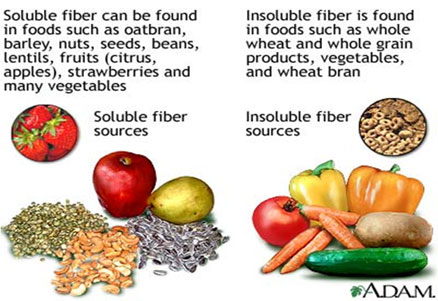Answer: Fiber, indigestible chains of carbohydrate present in all plant foods, is categorized by its ability to dissolve in water. Fiber that partially dissolves in water is labeled soluble fiber and that which does not dissolve in water, insoluble. These differences lend unique benefits to each type of fiber in the diet.
Soluble fiber helps lower blood cholesterol and can reduce the risk of heart disease. It also slows glucose absorption and can help manage and/or lower the risk of developing diabetes. In addition, soluble fiber swells as it takes on water, leading to a greater feeling of fullness and aiding in appetite control.
Insoluble fiber helps prevent and alleviate constipation, lowers the risk of diverticulosis (intestinal inflammation), hemorrhoids and appendicitis. It can also be effective in helping to manage a healthy weight.
Good sources of soluble fiber include oats/oatmeal, fruits and nuts. Good sources of insoluble fiber can be found in cereal and whole grains, rice, barley couscous and vegetables.
The American Dietetic Association recommends an intake of 20 to 35 grams of fiber per day for adults.
